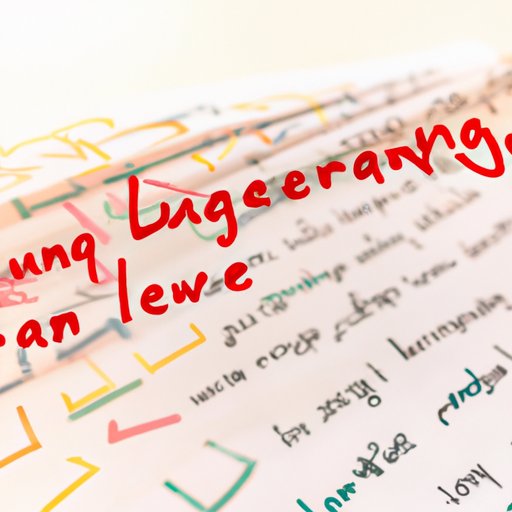
Introduction
Learning a new language can be a challenging task, but it can also be one of the most rewarding experiences in life. Not only does it open up new opportunities for travel and cultural experiences, but it also enhances cognitive skills and benefits personal growth. However, it can be overwhelming to know where to start and how to effectively learn a new language. In this article, we will discuss six effective methods to help you learn a new language by immersing yourself in the language, building a consistent routine, applying psychological principles to learning, making it fun, experiencing the culture, and finding support and connection.
The Immersion Method: How to Fully Immerse Yourself in a Language and Learn it Quickly
One of the most effective ways to learn a new language is to immerse yourself in it. The immersion method involves surrounding yourself with the language as much as possible, in a way that simulates the experience of living in a country where the language is spoken. One of the easiest ways to immerse yourself in a language is by speaking with native speakers. You can join language exchange groups, attend events and meetups, or use language exchange apps like Tandem to connect with native speakers. Additionally, you can watch foreign films and TV shows, listen to local music, and try to read books in the language.
To get the most out of these immersion methods, it can be helpful to set specific goals, practice regularly, and prioritize understanding over memorization. Don’t be afraid to make mistakes and embrace the learning process as a journey of discovery.
The Power of Consistency: How to Build a Learning Routine to Master a New Language
Incorporating language learning into your daily routine is crucial for building momentum and staying committed. Dedicate specific times each day or week to language learning, and stick to it as much as possible. Some effective ways to maintain consistency include using language learning apps, taking classes, listening to podcasts, and integrating language learning into daily activities like commuting or exercising.
It’s essential to build a personalized learning routine that fits within your schedule. Creating a study plan that includes specific goals, setting up a study area that is conducive to learning, and using online resources such as flashcards, can all contribute to a successful routine. Additionally, it’s important to remind yourself of the benefits of language learning to stay motivated and committed.
The Science of Learning: How to Use Psychology Principles to Learn a New Language
The field of cognitive psychology provides insight into how we learn best. Some of the most relevant principles to language learning include spaced repetition, chunking, and active recall. Spaced repetition involves reviewing information regularly over time to reinforce it. Chunking involves breaking down large amounts of information into smaller, more manageable pieces. Active recall involves actively recalling information instead of passively reading or hearing it.
To apply these principles to language learning, consider using spaced repetition apps like Memrise or Anki. Additionally, it can be helpful to break down complex grammar concepts into smaller, tangible parts, and actively practice using new vocabulary and grammar rules.
The Fun Approach: How to Learn a Language by Playing Games and Having Fun
Learning a language doesn’t have to be boring or tedious. Incorporating fun activities into your language learning can keep you motivated and engaged. Try using language learning apps or play language games like Scrabble or Bananagrams. Additionally, attending cultural events, watching movies, and listening to music can all be enjoyable ways to learn a new language.
Combining fun activities with other language learning methods, such as immersion or the power of consistency, can create a more enjoyable and effective learning experience.

The Cultural Experience: How to Learn Language and Culture Together
Language and culture are deeply intertwined, so it’s important to learn them together. To understand a language fully, you need to understand its customs, traditions, and history. A great way to incorporate cultural learning into your language learning is to attend cultural events, read cultural literature, or visit a country where the language is spoken. By connecting with the culture, you can better understand the context in which the language is used, and improve your language skills as a result.
The Support System: How to Get Help and Connect with Other Learners
Learning a language can also be a social experience. Building connection and support with other learners can be motivating, provide accountability, and offer helpful guidance. Consider joining language exchange groups, online classes, or hiring a tutor. Technology has made it more accessible than ever to find resources and support for learning a new language.
To make the most of these resources, make sure to connect with people who share your goals and interests. Don’t be afraid to ask questions or practice speaking with others as much as possible.
Conclusion
In summary, learning a new language can be a daunting task, but it’s essential to enjoy the journey and find the methods that work best for you as an individual. By immersing yourself in the language, building a consistent routine, applying psychological principles, making it fun, experiencing the culture, and finding support and connection, you can achieve language learning success. Remember, learning a new language can open up numerous opportunities and contribute to personal growth, so embrace the challenge and enjoy the benefits that a new language can bring.





